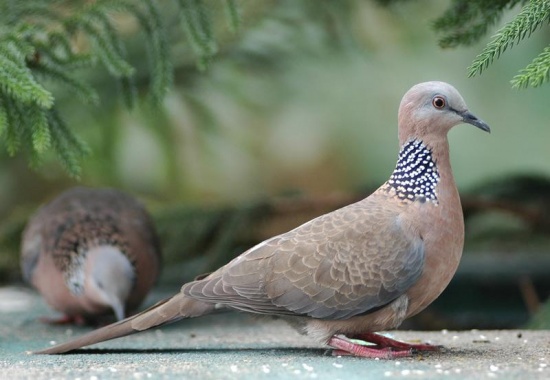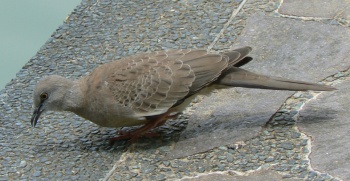(photo captions) |
|||
| Line 8: | Line 8: | ||
==Distribution== | ==Distribution== | ||
| − | Southern [[Asia]] from [[Nepal]], [[India]] and [[Sri Lanka]] east to south [[China]] and Southeast Asia. It has been introduced to parts of the [[United States]] and [[Australia]]. | + | Southern [[Asia]] from [[Nepal]], [[India]] and [[Sri Lanka]] east to south [[China]] and Southeast Asia. It has been introduced to parts of the [[United States]] and [[Australia]]. An abundant introduction in the Hawaiian Islands. |
==Taxonomy== | ==Taxonomy== | ||
Revision as of 00:13, 6 March 2014
- Streptopelia chinensis
Stigmatopelia chinensis
Identification
28-32 cm. Pale brown back, wings and tail, heavily spotted with buff, blackish flight feathers bordered on the inner edge with pale grey. Pink head and underparts, pale grey on face and lower belly, black neck patch finely spotted with white. The legs are red. Sexes are similar, but juveniles are duller than adults often lacking the patchy neckband when very immature. The call is a low and gentle coo-coo-croo, with the emphasis on last note.
Distribution
Southern Asia from Nepal, India and Sri Lanka east to south China and Southeast Asia. It has been introduced to parts of the United States and Australia. An abundant introduction in the Hawaiian Islands.
Taxonomy
Three subspecies are recognized:[1]
- S. c. suratensis
- S. c. chinensis
- S. c. tigrina
Sometimes placed in genus Spilopelia.
Habitat
Open woodland, farmland and habitation.
Behaviour
They are fairly terrestrial, foraging on the ground in grasslands and cultivation.
It breeds all year round with stick nests commonly found in trees, edge of buildings or on the ground. 2 white, glossy eggs are laid.
The diet includes grass seeds, grains and other vegetation.
References
- Clements, JF. 2008. The Clements Checklist of Birds of the World. 6th ed., with updates to December 2008. Ithaca: Cornell Univ. Press. ISBN 978-0801445019.
Recommended Citation
- BirdForum Opus contributors. (2024) Spotted Dove. In: BirdForum, the forum for wild birds and birding. Retrieved 29 April 2024 from https://www.birdforum.net/opus/Spotted_Dove





